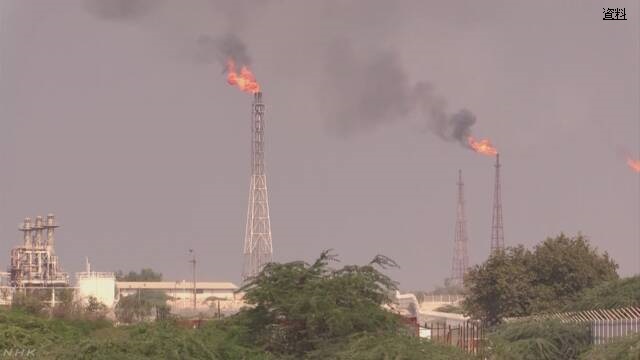Crude oil price slump Serious impact on oil-related companies in Europe and the US New Corona 6:13 on May 1
Oil-related companies, Royal Dutch Shell, announced that it would reduce the dividend on its stocks in spite of sluggish crude oil prices. Western media reports that it is "the first time since the Second World War."
Despite the fact that OPEC and the Organization for Oil Exporting Countries and Russia have decided to reduce their production on a large scale, crude oil prices continue to remain sluggish, and a number of affiliated companies have collapsed in the US.
Among the petroleum-related companies, a giant company called "super major", "Royal Dutch Shell," announced its financial results by March 30th, and the profit during the period was at the same time of the previous year. Compared with the decrease of 46%, it was almost halved.
It was due to the slump in crude oil prices, but what surprised the people involved was the decision to reduce the stock dividend, according to Western media, "for the first time after World War II".
CEO Ben Van Bourden, the top executive, said that “a significant decrease in global demand for crude oil had a major impact on all management” and said that the future remains uncertain, in addition to a reduction in dividends and share buybacks. It shows the idea to stop and secure cash at hand.
The US crude oil futures price, which has been negative for a while, has remained at a low level of less than $ 20 per barrel, which is serious for the US shale oil industry, which is said to be "profit line over $ 40". Is influencing
It has been reported that three listed companies alone have failed in the first month of April, and in the United States, "if crude oil prices continue to stagnate, more than 100 companies will be stuck in the future."
Although President Trump has announced that he will launch public support, the US oil industry remains virtually blind to the bottom.
Coordinated production cut to reduce approximately 10% of world crude oil production
While crude oil prices remain sluggish, OPEC and oil-producing countries such as Russia will raise their prices by carrying out coordinated production cuts that reduce approximately 10% of world crude oil production from the day.
However, there are many views that the situation of oversupply will not be resolved immediately, and there is continued caution that the historical slump in crude oil prices will affect the economy of oil-producing countries and lead to financial market turmoil.
Saudi Arabia-led OPEC and non-member oil producing countries such as Russia will cooperate to reduce crude oil prices by cutting 9.7 million barrels per day, which is approximately 10% of the world's crude oil production, starting on the 1st, based on the agreement in April. We will reduce production.
However, even after each country reached an agreement to reduce production, the price of crude oil has not started to rise, and in the New York market last month, there was an unusual situation where the futures prices of some crude oil fell to negative levels for the first time.
Demand for crude oil has fallen sharply due to the spread of the new coronavirus, and inventories continue to increase in the United States.However, even if the coordinated production cuts were steadily implemented this time, Many believe that oversupply will not be resolved soon.
While oil-producing countries are starting to have serious financial and economic impacts and growing concerns about social unrest, market officials warned that a historically low oil price could lead to financial market turmoil. Continues.
Saudi Arabia Revenue from January to March Decrease by more than 22% year-on-year
For Saudi Arabia, revenues from January to March are expected to remain at around 5.5 trillion yen, down 22% compared to the same period of the previous year, or 1.5 trillion yen in Japanese yen.
Oil revenue, which has accounted for 60% of the annual revenue, has decreased by 24% and the Japanese yen has decreased by more than 1,150 billion yen.
In addition, foreign exchange reserves decreased by 23.9 billion dollars in the first month of March and 2.5 trillion yen in Japanese yen, which is an unprecedented scale in recent years.
The decline in revenue due to the spread of the new coronavirus is expected to continue, and the financial situation of Saudi Arabia is unavoidable as the Saudi Arabian Ministry of Finance has indicated that it will double its debt this year. It is a prospect.

